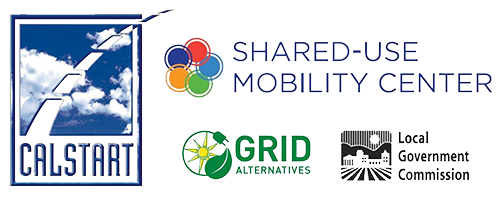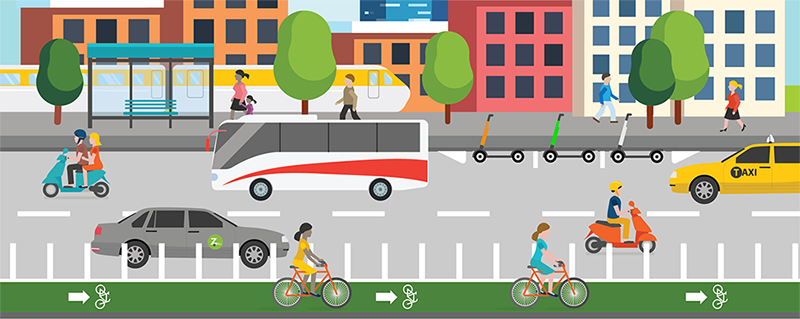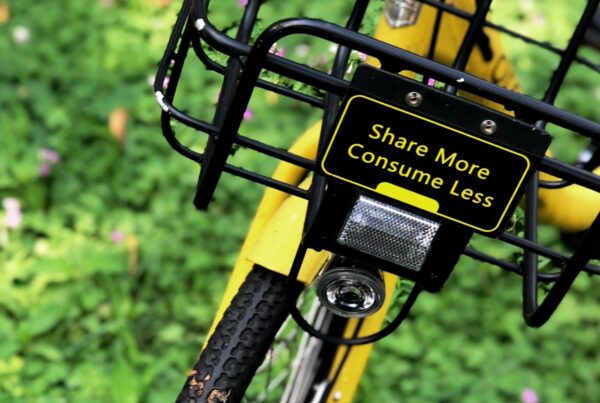Welcome to the Shared-Use Mobility Center’s weekly guide to the most impactful news, thought-provoking articles and innovative technologies that are shaping our transportation future. We believe in sharing information, just like sharing cars, bikes, and scooters, so if there’s anything additional you’d like to see, just drop us a line.
SUMC News and Announcements
 Clean Mobility Options Needs Assessment Awardees Announced
Clean Mobility Options Needs Assessment Awardees Announced
24 disadvantaged areas in 14 CA counties to receive $1.15 million to reach out to communities about clean and equitable transportation solutions.
The Clean Mobility Options Voucher Pilot Program (CMO) awards up to $50,000 each to nonprofits, local governments, transit agencies, and tribes in under-resourced communities to conduct “Community Transportation Needs Assessments.” These assessments help them engage residents so they can understand and address transportation gaps. See awardees and locations.
CMO provides funding for zero-emission shared mobility options to under-resourced communities in California. It is administered by CALSTART and Shared-Use Mobility Center (SUMC) in partnership with GRID Alternatives and the Local Government Commission. Visit the CMO site to learn more.
cleanmobilityoptions.org
Reminder: The doors open on October 20, 2020 to submit your Mobility Project Voucher Application for up to $1 million of project funding. Learn more and apply here: cleanmobilityoptions.org/application-materials
On our Radar:
Public-Private Partnerships in Logistics and Transportation: Implications for Efficiency and Effectiveness
October 15, 2020 12:00-1:00 PM Central
The role the private sector can play in long-range transportation decisions is the subject of the next webinar from the University of Illinois at Chicago Urban Transportation Center’s Fall 2020 Seminar Series. Dr. Anthony A. Pagano, Director of the Center for Supply Chain Management and Logistics at the university, will speak. Learn more and register.
Podcast Episode: Winning the War on Cars in Rural America
The War on Cars in Brattleboro, Vermont shows us how we might reduce car dependence in suburbs, small towns, and rural places. Featured is Public Transit Coordinator Ross MacDonald of the MOD Sandbox grantee agency the Vermont Agency of Transportation (VTrans). Tune in.
Fill up your calendar with Federal Transit Administration events
Stay in the know and connect with colleagues at roundtables, webinars, workshops, and more. View the calendar.
Mobility Justice
On September 19, a casual bike ride became a “community ritual” as violence prevention and youth development organization BUILD and mobility justice nonprofit Equiticity hosted the 60-rider, seven-mile Austin Peace Ride that gathered cyclists, transportation equity advocates, and local community members to promote solidarity and positivity by riding their bikes.
The US Governors Highway Safety Association believes that nationwide police reform is how to address racism in traffic policing, but advocates point out that past experiments with reform have done little to stop racial injustices and call for complete abolition while focusing on restructuring the system so that unarmed civilian services address traffic violations.
Extreme heat issues are no stranger in states like Arizona but many areas, especially in indigenous and Communities of Color like Edison-Eastlake in Phoenix and Mesa’s Mesa Care, have scarce access to effective cooling resources to stop the scourge of heat-associated deaths that disproportionately affect lower-income neighborhoods. Now at last, The Nature Conservancy in Arizona has garnered enough local support to end this injustice.
Ridehailing/Carsharing/Carpooling
Uber is reportedly considering a purchase of Daimler and BMW’s Free Now ridehailing business to gain a stronger foothold in the European and Latin American markets. This comes over a year since the two auto giants formed a joint venture by combining many competing mobility services to streamline operations.
The Massachusetts Clean Energy Center has awarded the City of Boston, along with other planning and project-focused organizations, a grant to test an electric-vehicle carsharing program that includes income tiers to help address mobility equity in the Roxbury neighborhood.
The Twin Cities Electric Vehicle Mobility Network, an ambitious partnership between St. Paul, Minneapolis, Xcel Energy, the American Lung Association and carsharing nonprofit Hourcar, is gearing up to launch 50 shared EVs next summer with the program hitting “150 vehicles by about mid-2022”. Learn more about the mobility project on MinnPost.
Volkswagen will be supplying Uber with e-Golf EVs in Berlin as part of the ridehailing company’s “Uber Green” initiative to become a zero-emissions, sustainable mobility offering.
Bikesharing and Micromobility
A new proposed bill in New York, lead by State Senator Jessica Ramos, would change the e-bike width limit from 36 inches to 55—allowing for the massively revolutionary legal use of cargo e-bikes and e-trikes in the city and creating a big win for sustainable, space-efficient transportation options for delivery.
Chicago is lacking in providing safe, dedicated, and protected bike infrastructure to cyclists, and the Active Transportation Alliance’s latest analysis zeroes in on the issues surrounding it, i.e. lack of capital funding and missed cooperation with the state.
How could subsidies for e-bikes boost cycling in the US and help decrease America’s emission-inducing reliance on the auto? Rice University’s Kinder Institute takes a look at how simple rebates could get people, more specifically in Houston, back on two wheels for short-to-mid-distance trips without breaking a sweat.
Portland State University’s Transportation Research and Education Center has released results about the city’s bikeshare ridership numbers, which show BIKETOWN trips down 72.7% compared to 2019.
Transit
A new report published by consulting firm Sam Schwartz for the American Public Transportation Association has found New York transit users have a very low risk of COVID-19 infection while riding the bus or train. This comes after finding no correlation between the spread of the virus and the use of public transit when looking at similar data for worldwide public transportation systems.
More than ever, all levels of government need to align to keep public transit running reliably and safely during this pandemic and focus on building better, more resilient spaces for active transportation modes to thrive in the long-term.
The updated version of the HEROES Act making its way through Congress includes $32 billion for transit and $2.4 billion for Amtrak, but will need to pass both the House and Senate before hitting the President’s desk. Congress will need to act swiftly to pass the measure and ensure that our cities’ transportation systems continue to function for millions in order to #SaveTransit.
LA Metro’s updated $400 billion, 30-year plan for transportation development in the area was approved by its board of directors with a notable goal to “build more than 100 miles of rail in the next three decades”.
Technology
Autonomous vehicle tech company Zoox has received a permit from the California Department of Motor Vehicles to start testing driverless cars on public streets—without a human safety operator behind the wheel—making it the fourth company to get authorization in the state.
Google Maps now includes a “COVID-19 Info” layer that will show a color-coded overlay of confirmed cases by area (states, county, or city) per 100,000 people to help those navigating “make more informed decisions about where to go and what to do.”
A new consumer study out of self-driving tech startup Motional shows that about 19% of the 1,003 Americans surveyed are more interested in autonomous vehicles now than before the pandemic with 62% of them believing that AVs are “the way of the future”.
On the driverless transit front, the Automated Bus Consortium and creator AECOM, alongside the American Public Transportation Association, have announced completion of “the country’s first-ever automated bus performance specification” to kickstart the development of full-sized, self-driving transit buses in the US.
Sustainability
Making a stand on securing a cleaner future for the state, California plans to ban the sale of new gas-powered cars by 2035 to combat the severe effects of climate change, pollution, and fossil fuel reliance.
Michigan Governor Gretchen Whitmer signed an executive order last week that plans for the state to be carbon neutral by 2050 to address emissions and climate change, and wants the forthcoming climate plan to tackle environmental justice issues for disproportionately-impacted communities.
A new landmark bill signed by New Jersey Governor Phil Murphy enacts “the strongest environmental justice law in the nation”, protecting disadvantaged communities by requiring any company or entity to submit an evaluation of the potential effects on asthma, lead poisoning, cancer, and cardiovascular disease.
As reported earlier, California wants to move towards a zero-emissions transportation future by banning gas-powered vehicle sales by 2035, but is there enough charging infrastructure to support the incoming wave of EVs? Climate policy think tank Energy Innovation believes it won’t happen unless developers and multi-unit dwelling managers get on board.
Requests for Proposals, Inquiries, and Information
Shared-Use Mobility Center Job Postings
See current openings
RFP: Bike Share Study & Optional FLMM Study
Roaring Fork Transportation Authority
Glenwood Springs, Colorado
Deadline: October 09, 2020, 11:00 AM (Mountain)
RFP: Services for the Chestnut Street Multimodal Station, Shared Services Facility & City of Oxford Passenger Rail Platform
Butler County Regional Transit Authority
Oxford, Ohio
Deadline: October 19, 2020
RFP: Three Health Care Shuttles for Salem County Senior Residents and Limited Disabled Residents, and General Population in a Rural Area
Salem County
Salem, New Jersey
Deadline: November 05, 2020
NEW RFP: $200 Million For Renewable Energy Supplier for All City-Owned Buildings
City of Chicago
Chicago, IL
Deadline: November 6, 2020
Did someone forward this to you? Sign up for our newsletter here.



